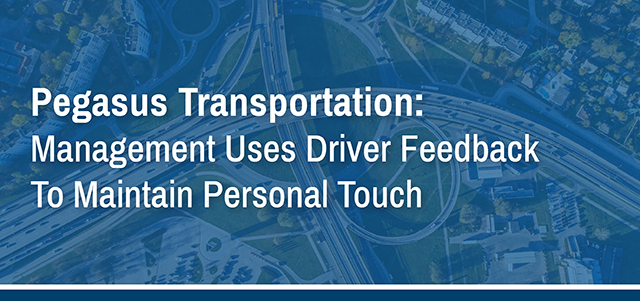Pegasus Transportation: Management Uses Driver Feedback To Maintain Personal Touch

CRST Pegasus Transportation has fared better than its competitors when it comes to driver retention, but a dip in early 2018 led the small company to look for ways to maximize potential business opportunities.
“Freight is plentiful, and we are missing opportunities every single day due to a lack of available capacity,” said Chad Bruek, Vice President and General Manager. “We’re having a good year, but it could have been record-breaking if it weren’t for our open trucks and the challenging driver environment.”
Many of Pegasus’s 425 drivers live near the company’s terminal in Louisville, KY. That proximity has contributed to frequent contact with management and built a level of trust that is often lacking with a distributed workforce. It helps that managers and employees focus on staying responsive to drivers’ concerns.
“Everyone in our organization understands that creating a positive environment for drivers is everyone’s responsibility and a top priority for our organization,” Bruek said.
Professional drivers always value higher pay and more hometime, but Pegasus strives to provide them a “sense of belonging,” he said. “It’s that personal touch that really has proven successful to us.”
While the company has worked to build relationships with local drivers, Bruek needed a way to get regular feedback, especially from those who live outside the Louisville area. The company adopted WorkHound in April to better understand the issues facing its entire fleet. The mobile platform lets drivers leave anonymous feedback on the conditions they face in real time. Managers can categorize the data to identify the biggest trouble spots and make changes that address them.
At Pegasus, Drivers were skeptical of the tool when it was first introduced. They didn’t trust that their feedback would remain anonymous or that it would contribute to significant improvements. That attitude changed once management began making changes based on drivers’ issues, Bruek said.
Some issues — traffic, weather, or personal events — are outside of management’s control. There are others, though, where small changes can have a big impact. For example, earlier this year Pegasus lowered its governed speed. Drivers were unhappy with the change and lodged their complaints through WorkHound. The decision was reversed as a result. WorkHound feedback also led to terminal improvements, including renovations to its drivers’ lounge to provide a more comfortable, inviting space, as well as repaving and restriping its lot to improve driving conditions.
Bruek uses the service to help him focus on employees’ needs. He reads every comment left by drivers and personally reaches out to those where he believes an actionable issue is being raised. (WorkHound gives drivers the option to reveal their identity to be contacted about one of their comments.) Bruek said this ability to respond is a powerful feature that helps him dig deeper into an issue he might be able to resolve.
“Many drivers who have traditionally been unwilling to speak up or share their concerns are now freely communicating with us and giving us a chance to help them be successful,” he said. “I anticipate that as we continue to gain momentum there is no question we will be back at industry-leading levels of driver retention.”
Let's Build Better Workplaces Together
Revolutionize your company culture and your worker retention rates by improving communication and engagement.
Book a Demo

